Provocative assertion, isn't it? But it tends to go right to the heart of why there is so much conflict among us frail, essentially powerless human species. The assertion raises for discussion what we instinctively know is important, but which we prefer to deflect or ignore. I thought it would be worth looking at this ponderous subject to try to shed some light on it-- in a fairly light, non-academic style.
Quick History: I don't intend the following to be a definitive and precise history of religion, but rather a quick entry into and out of it--just enough to help frame the discussion so that we may focus on the root cause of modern conflict. That conflict goes back to the time frame encompassed by and amply outlined in the Old Testament--several generations before the birth of Jesus. After his crucifixion this Jewish prophet's life and teachings were quickly organized into most influential institution in the western world. In fact, it became the official religion of the Roman Empire, establishing itself as an autonomous governing entity in the Vatican acreage, appropriately adjacent to Rome.
From magic talismans to a God in Our image: We trace religious expression ba
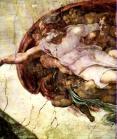 ck to magic and and those days wherein we ascribed most mysteries of life to objects such as animals, trees, stones, etc. As man became a little more sophisticated, he gradually sought solace in something more father-like, closer in configuration and demeanor of a human form. Such an image would bring people closer to something they could look up and relate to. And, during the era of Jesus, it was a consistent decision to fold this Prophet's persona (a totally human configuration) into the Old Testament image of God.
ck to magic and and those days wherein we ascribed most mysteries of life to objects such as animals, trees, stones, etc. As man became a little more sophisticated, he gradually sought solace in something more father-like, closer in configuration and demeanor of a human form. Such an image would bring people closer to something they could look up and relate to. And, during the era of Jesus, it was a consistent decision to fold this Prophet's persona (a totally human configuration) into the Old Testament image of God.Doing so required considerable logical slight of hand in order to explain this "fusion." Thus was born the mysterious and difficult trilogy "Father-Son-Holy Ghost," a concept requiring boundless faith*--now made a little easier to understand (although not by much), inasmuch as familiar images were presented to reduce some of the abstraction involved. This fusion of images necessarily led conveniently to the concept of transubstantiation (transforming body to spirit and vice versa); more important, this mysterious process--whether or not it was originally intended by the disciples credited with recording these alleged events-- imbued Jesus with the ultimate power (after Jesus's Resurrection, no one could deny that Jesus was not only the "Son of God," but, whenever He willed it so, God Himself). If local Romans or Philistines hadn't been believers in transubstantiation before Easter Sunday, they were after.
Reminder: This is where Judaism and Christianity depart company doctrinally. It's noteworthy that because their Torah does not recognize transubstantiation and the "Holy Trinity" that flows from it, Jews today still get heat from non-Jews for being "killers of Jesus" as depicted in Mel Gibson's wildy popular production, The Passion of Christ. (Conveniently, neither side makes room for the fact that Jesus was himself a Jew.)
*Faith: A friend of mine offers a useful definition of this convenient palliative (widely applied by all Occidental religions to bridge the measurable and the immeasurable) as being asked to believe something you know instinctively to be false.
In the Occident, two major sects originated: Judaism and Christianity. Although Judaism remained more or less homogeneous, the original Roman Catholic Church ("Peter, upon this Rock") splintered into two main rivals, Eastern Orthodoxy and a few hundred years later in Mainz, Germany: Protestantism. Martin Luther's audacious public protest in the 16th century was a traumatic revolution against the Catholic Church, and set in motion a continuous process of splintering. This process is especially rampant in the United States--probably because of the country's youth and extensive social and political freedoms, providing fertile ground in which to search for another, better "True Way."
Mohammedanism (or Islam), a Johnny-come-lately knock-off of Christianity* is a less mysterious version of Christianity (successfully adapted to accommodate Arab cultures) that emerged six centuries after the founding of Christianity. By the time of the Prophet Mohammed's death in the 7th century, his considerable number of followers carried his vision and dogma of the "One True Way" into most of the then-known western world--as far the Atlantic and the Mediterranean Littoral--where it was surprisingly and comfortably accepted. Scholars suggest it so easily replaced the stern nature of Christianity because it eliminated the unfathomable--for example, Islam doesn't recognize transubstantiation and rejects the "Holy Trinity" riddle. Otherwise, Mohammed's multiple messages from God were plagiarisms of Christianity's concepts of Heaven, Hell and salvation.
Note: The growth of Shari'a, Islamic Law--believed by most non-Islamic observers to be out of step with many tenets of western culture and mores (e.g treatment of women, etc.)--was a separate body of doctrinal social management techniques--uniquely Arabic in culture, but was not inspired by or connected to Islam's Christian roots. However, Islamic scholars maintain that Shari'a is based on a body of tradition that derived from the Prophet Mohammed's messages he claimed to have received from God.
*I know, I know, Muslims will find this an insulting description, given their belief that Allah sent Gabriel instructions to the Prophet Mohamed to set up a cleansed, fresh version of Christianity, which, Allah maintained had become corrupt over the preceding 600 years. However, because I am not an indoctrinated subject of this or any institution and because I intend this essay to be a brief, light treatment of a ponderous subject, I've taken a little literary license to highlight a valid historical fact.
In the Orient, much older versions of God exist in Buddhism, Hinduism, and their f
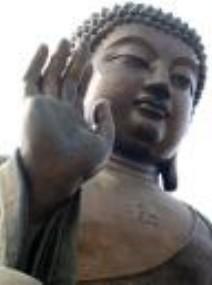 ew, very close cousins. In oriental religions, God is understood much less literally than in the Occident. God is understood more as "inner peace" and "personal realization of union with the spirit of enlightenment" (Nirvana). In aiming toward this union, harmony with one's total environment (external and internal) is the paramount lesson.
ew, very close cousins. In oriental religions, God is understood much less literally than in the Occident. God is understood more as "inner peace" and "personal realization of union with the spirit of enlightenment" (Nirvana). In aiming toward this union, harmony with one's total environment (external and internal) is the paramount lesson.The teachings of Buddha (Siddhartha) do not involve the detailed stories found in the West's literature to be found in the Bible, the Torah and the Koran; instead they consist of relatively short lessons and advice (true, the are often obfuscated in allegory) about people's personal behavior that will more efficiently promote them into Nirvana, or a state of "Oneness" with God. Having achieved successive "upward" levels of "awareness" in successive lives insures that individuals will continue on that path in each reincarnated existence. Generally speaking, this concept tends not to be very satisfying to the western mind, which usually prefers more substantive and details that confirm the existence of Heaven or Hell, along with specific instructions on how to assure the former and avoid the latter. On the other hand, the oriental approach offer fascinating alternatives to westerners disaffected by western religions; many cults have their origins in eastern divinities.
What's the "hook" in all religions? It's really pretty simple--we all wond
 er where we came from and where we're going. It's the eternal mystery that many prophets have attempted to answer since we learned how to draw pictures of mastodons on our cave walls. Occidental religions have developed a formal, written documents (Bible, Torah, Koran) that go into considerable detail to try and answer most, if not all, issues that constitute man's present and after-life. These documents leave little ground unturned, even if the answers to
er where we came from and where we're going. It's the eternal mystery that many prophets have attempted to answer since we learned how to draw pictures of mastodons on our cave walls. Occidental religions have developed a formal, written documents (Bible, Torah, Koran) that go into considerable detail to try and answer most, if not all, issues that constitute man's present and after-life. These documents leave little ground unturned, even if the answers to  many of our questions are more obscured than we'd prefer. The priests (rabbis and imams) are charged with seeing to the day-to-day functions of their respective institutions, as well as trying to keep their flocks from wandering too far from the tenets of their particular institutional doctrine.
many of our questions are more obscured than we'd prefer. The priests (rabbis and imams) are charged with seeing to the day-to-day functions of their respective institutions, as well as trying to keep their flocks from wandering too far from the tenets of their particular institutional doctrine.Interestingly, just as Oriental religions also attempt to answer the basic questions about the mysteries of existence, they do not publish one
 comprehensive document, such as the Bible, the Torah, or the Koran, in which adherents can study and seek answers. Furthermore, in what literature they do have, it tends to avoid trying to frame an overall, coherent story of creation, including a comprehensive moral code. Their "doctrine" comes directly from ancient oral traditions and tend to be disjointed "snippets" of the teachings of the original Prophet--Buddha (Siddhartha in India). It is up to the body of Buddhist priests, loosely integrated and dependent on their communities in which they are lodged, to deliver the teachings to individuals seeking "Oneness."
comprehensive document, such as the Bible, the Torah, or the Koran, in which adherents can study and seek answers. Furthermore, in what literature they do have, it tends to avoid trying to frame an overall, coherent story of creation, including a comprehensive moral code. Their "doctrine" comes directly from ancient oral traditions and tend to be disjointed "snippets" of the teachings of the original Prophet--Buddha (Siddhartha in India). It is up to the body of Buddhist priests, loosely integrated and dependent on their communities in which they are lodged, to deliver the teachings to individuals seeking "Oneness."While Occidental religions tend to be highly structured, with identifiable "headquarters" (the Vatican, Jerusalem, Mecca), and a definite hierarchy of authority, eastern religions have no equivalent. Furthermore, there is no one personage (such as the Pope) who represents ultimate earthbound guidance and authority for mankind. Tibet's "Dalai Llama" (still in exile since Red China forcibly annexed Tibet in 1954) is the closest personage serving at the top of a very loose Buddhist base; but even if the Dalai Llama were fully installed in Tibet, he would bear no similarity to the institutional characteristics of western religions, nor would he rule over a hierarchy.
Cults: Sandwiched between the mainstream religions, interesting off-shoots develop with regularity. They come in every variety imaginable and take the form ranging from off-the-wall nuts* to the "cult of personalities"** and to the more intellectually oriented cults.***
* For example, a few years ago there was the California bunch waiting for spaceships, hidden behind the Hale-Bopp Comet to land and pick them up just before Earth disappeared--while waiting for their rescue they ingested peanut butter and jelly sandwiches laced with a fatal concoction provided by their head guru, a long-tolerated California "sci-fi guru."
**Then, of course, there was the slightly less space-oriented Jim Jones who led his flock of 912 souls from San Francisco to Guyana, South America where, a few years later in 1978, he convinced them to drink Kool-Aid laced with cyanide.
*** Here's an example of one of the more intellectually-oriented cults; the following excerpt of
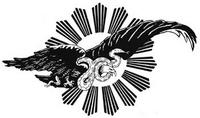 a world view happens to come from the website of Vitvan School of Natural Order:
a world view happens to come from the website of Vitvan School of Natural Order:We live in a vast energy world we call the universe or cosmos. Each one of us is a dynamic energy system. Yet most of us see and experience this universe or cosmos as a world of solid objects. We go about our daily existence unaware of the energy process of which we are all a part. There is a Power with which we are conscious, which motivates all activity. In each of us that Power-to-be-consciousness is striving to become aware of its true nature. --Vitvan
My own cult experience: As a teenager, I was exposed to one such cult headed by a gentle, intelligent, well
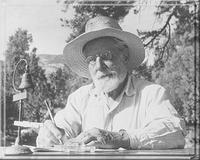 meaning intellectual, Ralph Moriarity deBit, who called himself Vitvan. My Dad, a physician, was every bit the type of intellectual attracted to Vitvan's use of modern scientific advances tied to a goodly dose of Eastern mysticism, using the results as metaphors to answer the same old questions as our cavemen forbears. In 1952 Dad schlepped me to one of Vitvan's summer seminars at the latter's School of the Natural Order in San Marcos, California. I was expected to catch on to Vitvan's insights after a couple weeks of intensive listening and meditating--but these were disciplines I hadn't yet mastered. But as a teenager I wanted very much to please my Dad, so I did my best to look and act attentive through the seemingly interminable lectures, which the kindly white-haired man conducted in his magnificent flower gardens in balmy southern California sea coast weather. When asked a few hours later, I confessed to Vitvan and Dad that it mostly went over my head--a seminal disappointment to everyone (frankly, lots of it still flies over me).
meaning intellectual, Ralph Moriarity deBit, who called himself Vitvan. My Dad, a physician, was every bit the type of intellectual attracted to Vitvan's use of modern scientific advances tied to a goodly dose of Eastern mysticism, using the results as metaphors to answer the same old questions as our cavemen forbears. In 1952 Dad schlepped me to one of Vitvan's summer seminars at the latter's School of the Natural Order in San Marcos, California. I was expected to catch on to Vitvan's insights after a couple weeks of intensive listening and meditating--but these were disciplines I hadn't yet mastered. But as a teenager I wanted very much to please my Dad, so I did my best to look and act attentive through the seemingly interminable lectures, which the kindly white-haired man conducted in his magnificent flower gardens in balmy southern California sea coast weather. When asked a few hours later, I confessed to Vitvan and Dad that it mostly went over my head--a seminal disappointment to everyone (frankly, lots of it still flies over me).That's not to say I didn't make a good effort--a few years later I bought several of Vitvan's works and tried my best to interpret some of his most esoteric writings, copiously accompanied by all sorts of drawings and symbols that sometimes bore resemblance to mathematic and physics symbols I recognized from my high school and college studies. However, my best efforts were not satisfying. I concluded privately that I still wasn't "ready."
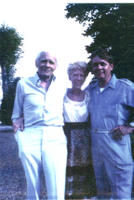
Some years later, I agreed with Dad that the various attempts to indoctrinate me early on failed, mainly because I was not "ready." But the cult remained in my memory, so that in 1968, while studying for an advanced degree in Boulder, Colorado, I learned that Vitvan's school had recently moved from southern California to the high desert near Baker, Nevada . Being within a hard day's travel from Boulder, during a semester break I drove to the new headquarters at my Dad's invitation. I later learned that Dad was vying for Vivian's mantle as leader of the cult, so I came as close as I ever would to being inducted into the cult world as I ever would.
During the visit, Dad offered to appoint me administrator of the School of Natural Order and at some point in the future, assuming I would acquire a sufficient level of spiritual understanding I so far lacked, I might be in line for eventual succession. After a couple days sharing in the preparation of a communal meal, doing some outdoor communal garden work, and attending one or two of Dad's evening group meditation sessions, I concluded privately that I wasn't cut from the proper jib for the esoteric life.
I later learned that Dad, by the reckoning of the majority faction of Vitvan's devotees, was fomenting internal dissension by introducing large doses of Eastern philosophy and unfamiliar meditative techniques into "vintage Vitvan doctrine"--a predisposition I suspect he acquired from the time he spent in China during WWII. The majority of Vitvan's followers considered Dad's "theology" to be heretical, so much so that he was rejected as Vitvan's successor.
So as it turned out, Dad's unsuccessful bid ended any future I might have had at the School of Natural Order, sparing me from having to tell him that I probably would never be spiritually "ready." So I returned to my academic studies in Boulder and that was the end of any apron strings that may have tied me to the cult life.
Update: The School of the Natural Order, to my surprise, today has its own website and, if the webmaster's last update in May 2005 is any indication, the school may still exist, although I suspect it may be headed for extinction, as is the fate of most cults (Christianity, Judaism, and Mohammedanism being major exceptions). If you're interested in gaining a quick impression of the esoteric nature of this "intellectual" cult, a quick glance at "A glossary of terms" (accessible from a link on the Home Page) will be sufficient. In case you have better places to surf, here's a flavor of what to expect should you seek Nirvana through Vitvan's teachings (which are probably well corrupted by now, judging by the fact that the lectures are given by "student volunteers"):
Last year's seminar (2004), titled "Polarity & Union," was a busy and intense. In the next seminar, we will explore the many faceted aspects of this topic ranging from male/female, to light/dark, positive/negative and a host of other "opposites". We will have the opportunity to examine these opposites from a philosophical, electric, electromagnetic, social, natural, scientific, and "Buddhistic" worldview. Various students have volunteered to lead discussions in their areas of expertise.
A personal footnote (in case you care): Some of us are more gifted than others (or bedeviled, as the case may be) in matters divine in pursuit of the answers to the questions: "Where did I come from?" or "Where will I be going?" Others of us are not as obsessed by those questions and are content to "go with the flow." I fall into the latter category and am at peace with uncertainty. As long as people can follow Ambrose Pierce's advice ("Be as decent as you can . . . . treat things divine with marked respect, but don't have anything to do with them"), they will be constructive and ethical members of their society. When people engage me with the question of God's existence, I recall an Air Force general (of all people) asking me rhetorically : "O.K., let us assume God exists. Then tell me, who created God?" Simple question, but the answer is elusive. When I posed it to an influential Costa Rican bishop (over a Heineken after a couple sets of tennis), he shook his head pensively and said : "Tienes que tener fe" ("You have to have faith.")
Historical tyranny: Is there any doubt in anyone's mind (assuming it's a reasonably independent mind) that organized religion has been and continues to be the fundamental reason for the widespread conflict among men--especially in the West? Do you really want me to go through the long litany of conflicts? Just look into any well edited historical almanac, encyclopedia, or history textbook and start your investigation to any time after the birth of Jesus. There are hundreds of examples of purely religious conflicts--the most well known being the Crusades of the 11th and 12th centuries--when the Catholic Church decided to push Mohammedism back to the Arabian Peninsula, with the symbolic goal of recapturing Jerusalem (which has since been effectively "recaptured" by Muslims--a source of current religious, social and political tension between the Jews' Muslim antagonists and the Israelis).
We can fast forward and leap over hundreds of other (less grandiose) conflicts to the example of Protestant and Catholic friction in Ireland. It usually comes as a shock to the tourist to discover, that when traveling to and from the British (Protestant) occupied Northern Ireland, British military outposts check ID and vehicle papers; villages are surrounded by walls and barbed wire and are guarded at specified entry/exit points. Evidence of war (especially in the larger towns) is everywhere: burnt out buildings, rubble, bullet-ridden edifices, etc. This conflict is nearing its centennial anniversary; no one today doubts that the reason for this protracted violence is unadulterated religious tension, despite the economic and social components that support and sometimes even spur the conflict. In 1977 I stayed overnight near Londonderry in a B&B run by a Protestant family who shared with me their misery, grief and unhidden hatred for "undisciplined" Catholics on "the other side of town."
If some examples of conflict do not seem to have such overt and obvious religious motivations, if you peel back a few layers of rhetoric--some of which finds its way into the history books--you'll find religious motivation to be the energizing force. For example, many observers correctly maintain that World War II was a struggle for the supremacy of authoritarianism (enslavement of the individual) over democracy (the liberation of the individual), along with sub-themes of economic factors --"Lebensraum" being the most obvious. However, looking slightly beyond the labels, the actual motivating energy turned out to Christianity versus Paganism. In recent years, interesting postwar research has demonstrated the contempt Nazi ideologues had for Christianity and their intention of reviving ancient Teutonic pagan cultural practices, which Hitler and Himmler believed to be primeval chemistry to create a healthy, dominant society--inhabited by the so-called perfect "Aryan."
Finally, consider briefly the 45-year Cold War struggle between Communism and Democracy--this titanic contest was clearly between two religions: Marxism itself was raised to the status of a religion by positing idealized Man--capable of accomplishing all things (when free of his capitalist chains and having achieved "pure communism")--as perfection. Opposing Marxism was Democracy, which was, by inference God's domain and which, therefore, was destined to struggle against godless Communism.
Because this essay is not intended to be a complete history lesson, I'll not expand this discussion any further. If you're interested, you can analyze any facet of most conflicts and find the energizing force driving them to be religious zealotry.
Conclusion: Unless you reject my straightforward thesis, which I've bolstered with some examples from history, the conclusion should be obvious. Until we humans can find a better way of satisfying our thirst for knowledge about our origin and our destination, our future will be beset by conflict, as long as people continue to assert with great conviction: "My God's better than your God!" (And, I should add, as long as they're also willing and anxious to take up the sword in defense of their better God, as their forbears have always been.)
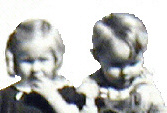
2 comments:
Grant... wow dude. You really believe all of this? You've created an interesting perspective on things, which porbably fits comfortably into your general worldview--but frankly, the perspective is a little skewed.
I can sense that you don't like religion very much, or faith. Thing is, everyone has a religion and faith. It's part of the human condition. This page demonstrates that you certainly aren't exempt either.
Yo, "dude." Yup, I really believe all that! Wouldn't have written it, just for the fun of it.
If you read the entire piece, you will know EXACTLY where I stand on religion and faith. I left little to the imagination.
You'd have been more accurate if you had said "almost" everyone has a religion and faith.
I also remind you of a friend's defintion of "faith"--believing in something you know instinctively is false.
Thanks for your comment. Keep 'em coming!
Post a Comment